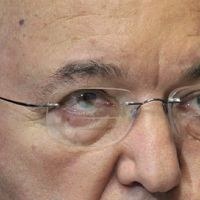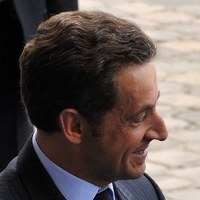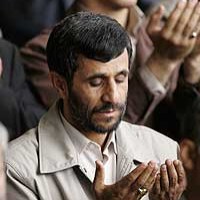BCRNJ3GWGNQ9
In a press release from BBC News, Ahmadinejad said on tuesday that “…anyone placing sanctions on Iran would be regretful.”
President Mahmoud Ahmadinejad was addressing a televised press conference in which he responded to Clinton’s suggestion that Iran is becoming a military dictatorship and to Russian’s indication that sanctions against Iran are still an option if Iran did not co-operate with the UN’s nuclear body.
Russia said Iran should improve its co-operation with the International Atomic Energy Agency and allay fears that its nuclear programme is for military use.
Earlier the Saudi Foreign Minister indicated his country would prefer a “more immediate solution” to the situation rather than slow-acting sanctions, but did not elaborate. On Monday Saudi Arabia’s Foreign Minister said imposing more sanctions on Iran over its nuclear programme would not be a quick enough solution. He spoke in Riyadh alongside US Secretary of State Hillary Clinton, who earlier said Iran was “becoming a military dictatorship.”
“If anyone does anything against Iran, then our response won’t be the same as in the past. No, we will definitely react and make them regretful,” president Ahmadinejad told a televised press conference. He also said that the comments of Clinton were “not wise.”
On Monday US Secretary of State Hillary Clinton said the government of Tehran was being “supplanted” by the Iranian Revolutionary Guards Corps, and was in danger of becoming a “military dictatorship.”
“We see that the government of Iran, the supreme leader, the president, the parliament, is being supplanted and that Iran is moving toward a military dictatorship. That is our view,” Mrs Clinton said on her maiden visit to the kingdom.
It was the first time a U.S. government representative expressed their concerns in such terms about Iran. Clinton said to an audience of students at a university in Qatar that the Iranian Revolutionary Guard has gathered so much power that they de facto supplanted the governments regime.
How to deal with Iran?
The five permanent members of the UN Security Council plus Germany, known as the P5+1, have said Iran must agree to swap their nuclear material for enriched uranium in a controlled process if they want to continue with their nuclear programme.
Iran has said it will agree to swap their material for French nuclear isotopes, instead of enriching their own, but they insist the swap is done in Iran’s territory.
The US, Israel and other countries fear Iran is attempting to develop a nuclear weapon. The status quo in the region will become unbalanced if Iran would develope a nuclear bomb and imply a direct threat for the US interests in the region and Israel. Iran insists its nuclear programme is entirely peaceful.
Last week the Iranian Presidency announced it had begun enriching uranium to 20%, more than they have done so before. On Tuesday Mr Ahmadinejad said this material was not part of “the nuclear programme”. Iran says it needs the 20% enriched uranium for hospital use.
“The international community must be sure that Iran’s nuclear programme is peaceful. But if these obligations are not fulfilled then nobody can rule out the use of sanctions,” said Russian Press Attache Natalya Timakova.
Clinton said the United States sanctions are in particular against companies controlled by the Revolutionary Guards. Last week Washington already announced unilaterally such sanctions against Iran. The profits of these companies are used for the nuclear and missile program of Iran, the Americans said.
The government of President Obama wants to send “a very clear message” to Iran that it remains open to negotiations to resolve the nuclear controversy, “but we will not idly watch how Iran continues a nuclear program that can be used to threaten their neighbors and even further.”
Clinton visits the Gulf looking for support on new sanctions against Iran. She will ask Saudi Arabia to guarantee oil supply to China, hoping to persuade Beijing to support new sanctions against Iran. China buys 400,000 barrels of oil per day from Iran and has many investments in the country. The Chinese fear a disruption of the crucial oil supply and loss of investment if they support new sanctions. China is a permanent member of the UN Security Council and can veto new UN sanctions against Iran.
Turkey is currently holding discussions with Iran on the possibility of getting an agreement where Iran’s nuclear material could be stored in Turkey. On Tuesday, Turkey’s foreign minister is due in Iran aiming to mediate.
Turkey recently deepened its (economic) ties with Ahmadinejad’s Iran and will not benefit from another armed conflict in its backyard. Turkey is also a Nato member, and Ahmet Davutoglu is expected to try to promote a deal on Tehran’s nuclear programme between Turkey’s western allies and Iran’s Islamic government. But what next move will Turkey make when a deal stays out of sight?
In the meantime, Israeli Prime Minister Benjamin Netanyahu has been clear about Iran’s nuclear threat, “The worst danger we face is that Iran would develop nuclear military capabilities,” he said. Israel has made clear that all options are on the table, including a military option. “We clearly believe that no option should be removed from the table. This is our policy. We mean it,” said Ehud Barak, Israel’s defense minister.
So who is going to stop Iran’s nuclear threat and will it be on time? Because some believe that the world may have waited too long, giving Iran time to develop its program. By some Israeli estimates, Tehran will be able to make a crude nuclear bomb within a year. And Ahmadinejad made no secret about his mission in this world, “to destroy Israel and to create an Islamic superpower” for the coming Islamic Messiah, the Mahdi.
Mazzeltov,
Crethi Plethi



 RSS
RSS











[…] both diplomatically and on a popular level, while Iran is confident as it marches toward producing a nuclear weapon and expanding its influence across the Middle […]